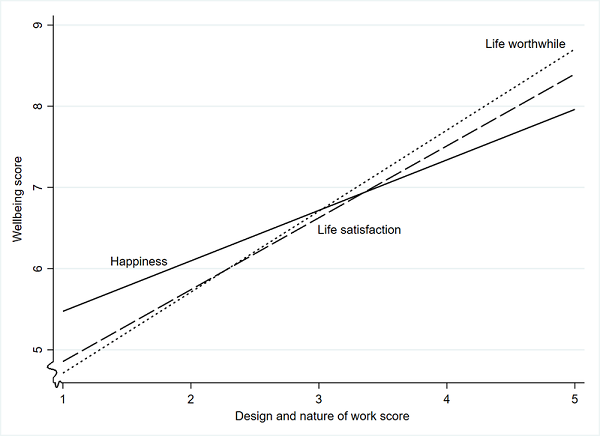The latest findings on job quality and wellbeing from the Graduate Outcomes survey raise some interesting implications for graduate employers, says Tej Nathwani, HESA’s Principal Researcher.
Higher wellbeing levels are known to raise productivity.
Based on the Taylor Review, HESA has derived a measure of job quality relating to the design/nature of work (i.e. how meaningful it is, whether it aligns with future plans and the extent to which it enables graduates to use their skills).
Our subsequent research indicates that a positive association exists between the design/nature of jobs being carried out by graduates and their wellbeing.
Evidence also suggests that Generation Z (generally those born between the mid-to-late 1990s and the early 2010s) graduates wish to find employment that can have a positive impact on society, as well as offering the opportunity to build their skills and develop their careers.
Graduate employers may therefore wish to consider whether this aspect of job quality could play a role in designing more effective recruitment and retention strategies.
Can higher wellbeing enhance employee productivity?
Recent literature has tended to indicate that higher levels of happiness can result in improvements in our productivity.
Indeed, a study carried out in an experimental setting by researchers at Warwick University suggests the mechanism by which this occurs is through individuals using their time more effectively.
Such findings inevitably raise questions for employers, such as how to create an environment that fosters greater wellbeing among workers.
How are the quality of our jobs associated with our wellbeing?
Typically, studies that have investigated what factors are associated with higher wellbeing have focused on the role of matters such as earnings, job security and mode of employment.
More recently, increased attention has been given to investigating the extent to which job quality is correlated with our present emotions (i.e. our happiness) and life evaluations (i.e. how satisfying or worthwhile we believe life to be), including by researchers at HESA.
Alongside questions on subjective wellbeing, the Graduate Outcomes survey asks recent graduates to highlight the extent to which they believe their job is;
- Meaningful
- Fits with their future plans
- Utilises skills learned during study
HESA has used these questions to develop a composite measure that relates to one dimension of employment quality (i.e. the design and nature of work), as identified by the Taylor Review. Our most recent study, published on 18 October, has investigated how this is associated (if at all) with graduate wellbeing.
In the Graduate Outcomes survey, individuals are asked to rate their happiness and how satisfying/worthwhile they believe their life to be on a scale from 0 to 10, where a higher score represents increased levels of wellbeing.
Meanwhile, our design and nature of work measure can range from 1 to 5, where a greater value indicates a better quality job. The figure below illustrates the association between our design/nature of work measure and wellbeing, with a positive linear correlation being evident.

What does this mean for employers?
We believe this to be the first piece in the UK to look at the link between the design/nature of work (as defined by the Taylor Review) and different measures of subjective wellbeing.
However, with Graduate Outcomes data being based on a survey, what we cannot currently establish is the direction of causality. That is, while it could be that the design/nature of employment leads to greater wellbeing, we cannot rule out at this stage that individuals with higher wellbeing are more likely to secure better designed jobs.
That being said, there are studies that have looked more broadly at the association between job quality and wellbeing.
The What Works Wellbeing centre – which exists to provide guidance to policymakers, employers and wider society on how wellbeing can be increased – has highlighted research that indicates that organisation-wide approaches that seek to improve job quality and wider wellbeing can boost performance.
Based on their own synthesis of evidence, the What Works Wellbeing centre has noted the importance for managers at all levels being aware of the link between job quality and wellbeing, as well as being committed to improving employment quality.
Additionally, research that seeks to explore how employers can recruit and retain Generation Z graduates has noted the value they place on work that can have a positive impact, as well as the opportunity to build their skills and further their careers.
While starting salaries will always play some role in career decisions, evidence suggests this is not the only issue that will determine the choices they make. Job quality may therefore be another factor graduate employers wish to consider as they look to design more effective recruitment and retention strategies.
Read more insight on student wellbeing


0 Comments